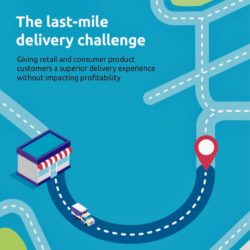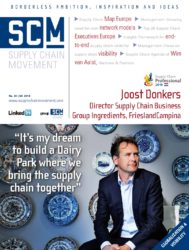Grocery retailers need to optimize last-mile delivery

Today’s consumer products firms and retailers in the food and grocery segment need to optimize their last-mile delivery processes in order to catch up with consumer demand while also mitigating associated profitability risks. That is the key takeaway from new study by the Capgemini Research Institute. The research revealed that although most consumers appreciate faster deliveries and more convenient time slots, just 1% of customers are willing to pay the full delivery costs – yet last-mile delivery is the most expensive part of the supply chain.
‘The last mile delivery challenge: Giving retail and consumer product customers a superior delivery experience without impacting profitability’ reveals that up to three-quarters of consumers are willing to reward retailers who get the last-mile delivery experience right with increased spend and loyalty. However, they are less prepared to reward them with hard cash; just 1% of consumers would be willing to foot the bill for the full cost of delivery.
Delivery service as a ‘must-have’ feature
On average, 40% of consumers order groceries online at least once a week, and this is expected to rise to 55% by 2021. A delivery service is considered a ‘must-have’ feature for grocery retailers by 39% of customers, with 13% even being prepared to take their business elsewhere if delivery services are not provided. Changing consumer behaviour is also creating more urgency: 59% of customers prefer to purchase products online as soon as they need them rather than waiting for the weekend to arrive so they can buy them in store.
According to the Capgemini analysts, the study shows that fast and effective last-mile delivery boosts not only consumer spend but also loyalty. Although 55% of customers say that a two-hour delivery option would increase their loyalty, only 19% of firms currently offer such a two-hour ‘express delivery’ service.
The true cost of last-mile delivery
Organizations currently pass on just 80% of the total delivery costs to consumers, even though last-mile delivery is the most cost-intensive part of the supply chain. The report claims that 97% of organizations believe that current last-mile delivery models are not sustainable for full-scale implementation across all locations. They will have to invest in improving this, according to the analysts, in view of the fact that 99% of consumers are unwilling to pay the total cost incurred.
“Today’s consumers are not satisfied with the delivery quality they receive, but they are not prepared to pay the total cost of last-mile delivery,” comments Tim Bridges, Global Sector Leader Consumer Products, Retail & Distribution at Capgemini. “So organizations face the challenge of giving retail and consumer product customers a superior delivery experience without impacting on their own profitability. If they succeed in this and keep their customers happy, retailers can expect to be rewarded with increased loyalty, a higher spend and increased purchase frequency.”










